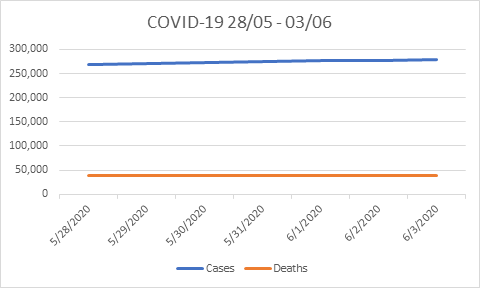This is the eleventh of a series of bulletins produced by ISE to update members on key data and policy on Covid-19. This bulletin just covers the period 28/05/2020-03/05/2020.
You can access all of the Covid-19 bulletins on the ISE website.

Data taken from Wikipedia and from the government’s Number of coronavirus (Covid-19) cases and risk in the UK webpage.
Ending lockdown
- The lockdown rules are different in each of the four UK countries.
- People were allowed to meet with up to six people this week.
- Lockdown was also eased for those who were shielding.
- Some shops are reopening with more planned for the next few weeks.
- The speed of the easing of lockdown remains controversial with some health officials and organisations arguing that the government is moving too fast.
- We remain a long way away from ‘herd immunity’.
Politics and policy
- The government has recalled parliament and ended the experiment in online democracy that has been running over recent weeks.
- Many of the communities that voted Conservative for the first time in 2019 look set to be worst hit by lockdown job losses.
- Public trust in the government’s handling of the Covid-crisis is declining.
Education
- Some schools have started back this week, but many are planning for start dates later in June. Some research suggests that this is safe, but many schools and parents remain unconvinced and are keeping young people at home.
- School closures during Covid-19 are expected to widen the attainment gap between the advantaged and disadvantaged.
- The Prime Minister has promised to look at launching an apprenticeship guarantee. But, details are still sparse as to how this would work.
- Don’t let Covid-19 derail your apprenticeship programme (ISE webinar).
- Universities are still unsure about their plans for September.
- Student number controls have been reintroduced. Wonke provides some detailed analysis on the changes. The government has placed a cap on the number of English students who can go to university in other UK countries.
- New research on the provision of career guidance during the lockdown.
Economy
- Education New data from the Office for National Statistics on the social and economic impacts of Covid-19.
- Jonathan Portes explores the long-term economic impacts of Covid-19.
Labour market
- Tony Wilson argues in Prospect that the unemployment crisis is just starting. This has also been argued by three former chancellors.
- A Campaign for New Starter Justice has been launched to argue for those who have started new jobs in recent months and aren’t covered by government Covid-support schemes.
- The chancellor is planning a job creation scheme.
- The Institute of Employment Studies launches a Covid-19 hub.
The student labour market
- Down but not out: The response of student employers to Covid-19. (ISE webinar).
- The number of NEET young people is rising and Covid-19 looks set to have a long-term impact on the life chances of young people. Russel Hobby of Teach First has argued that we need a youth recovery plan. A variety of proposals are starting to take shape to address this including the proposal to establish a civic army of young people to do good work.
- Concern about graduate unemployment continues to grow.
- ‘Getting on the Ladder’ – Challenges Facing Young People Leaving Education During COVID-19 (Blog from Professor Anne Green).
- School-to-work transitions during coronavirus: Lessons from the 2008 Global Financial Crisis (OECD blog).
- Luminate produce a monthly summary of graduate labour market data for May and Charlie Ball provides his detailed discussion of the latest data on his blog.
Recruiting during Covid-19
- 5 social media tips for student employers. (ISE blog).
Employers insights
The following insights are based on ISE’s interactions with employers during the period covered by this briefing.
- Campus activities. Most firms expect a substantial reduction of campus activities. This means changing the way that they work with student ambassadors and societies and moving to virtual careers fairs and other kinds of interaction. Lots of firms also report pulling out of advertising in and contributing to hard copy publications that would normally be distributed to campus.
- Virtual careers fairs. Firms are keen to participate in virtual careers fairs. There are a number of national providers who firms are negotiating with. There is less interest in directly working with universities on institutionally based virtual careers fairs.
- Diversity and inclusion. The Covid-19 crisis and the shift to online provision raises a number of issues for diversity and inclusion. There is a need to think more about tech poverty and other issues related to digital access more. However, there is also the potential for the shift online to open up recruitment and attraction activities and make them more available to a wider cohort.
- Summer placements. Many firms are not anticipating running summer placements. Some are offering virtual alternatives.
- Existing offers. Most employers are planning to honour existing job offers for reputational reasons. But, many conceded that this might lead to more hires than are needed and have an impact on next year’s recruitment.
- Candidate behaviour. Some employers are reporting that candidates were very uncertain about making decisions. Some were keen to ‘wait until Covid was over’ before they decide what they are going to do.
- Induction. Some firms are pushing induction back. Others are planning to induct people online. Most do not anticipate that face-to-face induction will be possible, even if the lockdown has started to more convincingly end by then. The rationale is that virtual inductions can be made face to face more easily than the other way round.
- Existing early career hires. Firms are still considering what they are going to do about their early career hires who are coming to the end of their training this year. There are concerns about whether there will be sufficient promotion opportunities and whether a salary increase will be able to be offered.
Was this article helpful?
YesNo


0 Comments